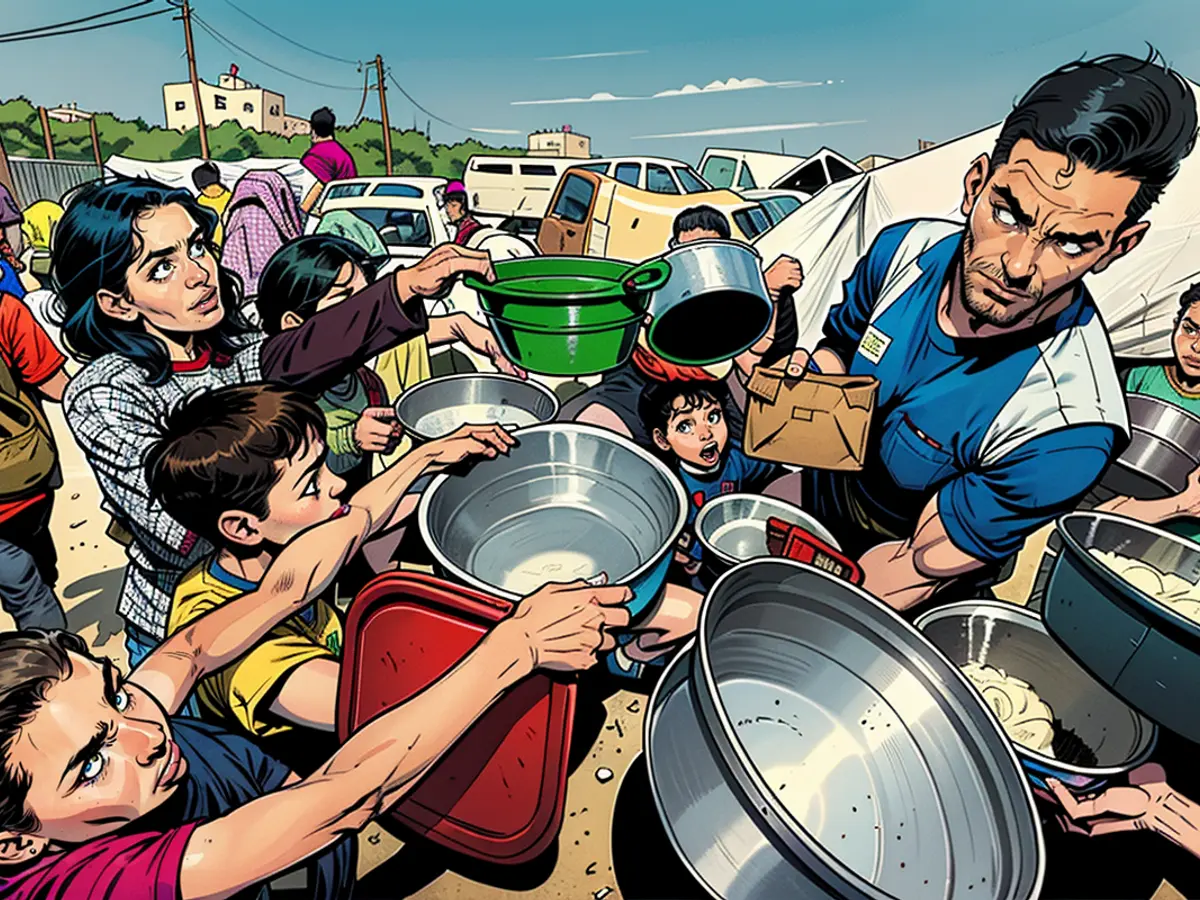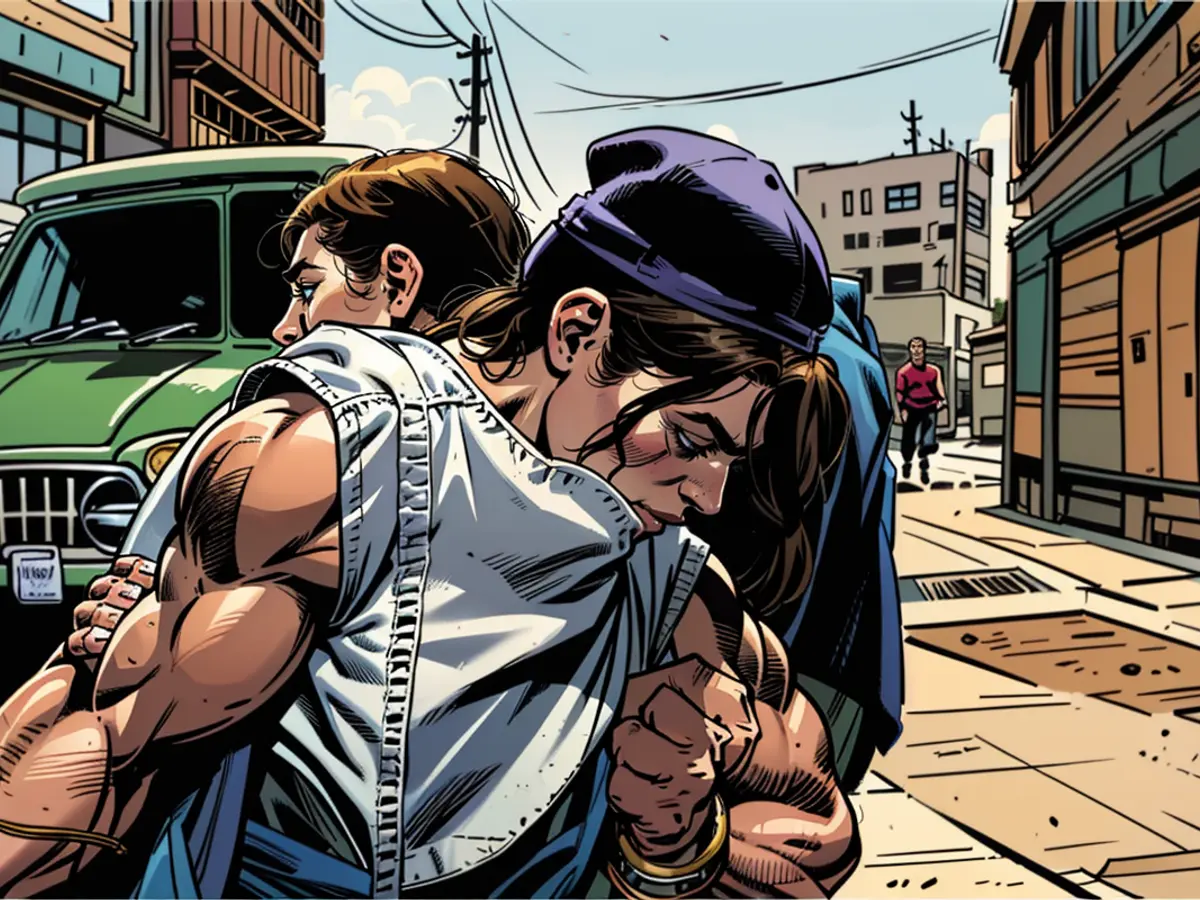These Gazan children have been reunited with their families after months of war. But thousands remain unaccompanied
“UNICEF phoned me and said they would send them over. Please, please God,” he said wiping the tears from his eyes, in a video shared with CNN by the UN children’s agency, UNICEF.
After nine months kept apart by war, his children were on their way to him.
“During those nine months, each day lasted nine years,” said Abdallah, whose last name was withheld by UNICEF to protect his identity and those of his family members.
Ten days after the war started, Abdallah’s pregnant wife and three children fled to the south of the Gaza Strip seeking safety. But two months ago, his wife, mother-in-law and one of his sons were killed.
“I have been eagerly awaiting them. Every day I yearned to hug them, see their mother and their brother. But that was God’s will. Their mother was martyred and so was their brother. I pray God will reunite me with the rest of my children safely,” he said.
When Abdallah finally held his youngest son in his arms Tuesday, it was the first time he had ever met him.
“My sweetheart, this is the first time I get to see you,” he said as he kissed his now 6-month-old son, in a moment captured on video by UNICEF. CNN did not speak to Abdallah directly but was provided with his account by the UN agency.
Abdallah’s children were returned to his care as a part of a reunification program run by UNICEF in Gaza, which helped seven children from four different families find their parents again on Tuesday alone.
The program has been running since March, and its mission is to track down relatives of unaccompanied children who have been orphaned or become lost or separated from their family in the strip, where the burden of Israel’s war against Hamas is weighing particularly heavily on Gaza’s youngest.
Of the more than 39,600 people killed by Israel since it launched its invasion into Gaza following the Hamas-led October 7 attacks, more than 16,000 are children, according to the latest figures released by the Ministry of Health in Gaza on August 7. CNN cannot independently verify the ministry’s numbers. The ministry does not distinguish between casualties among fighters and civilians.
Family members are stepping up to provide care where they can despite repeated displacements. One of the children involved in Tuesday’s UNICEF mission was reunited with his grandmother, who will now take care of him after his mother, father and siblings were killed.
But aid workers have told CNN that an increasing number of children – whose parents have either been killed or separated from them – are living with no support. Under-18s make up close to half of the population of the Gaza Strip, according to Palestinian census figures.
Israel’s repeated evacuation orders and the resultant forced displacement of populations are also causing spikes in reports of child abuse, as families are torn apart and support networks break down, according to Liz Allcock, head of protection at Medical Aid for Palestinians, an aid organization based in the United Kingdom.

Conflicts and war are known to exacerbate child protection issues, Allcock told CNN. “It’s not unique to Gaza,” she said. What makes Gaza different, however, is the repeated displacement of the population due to intense Israeli bombardment and frequent evacuation orders, she said. “There is largely a surge in reports (of child exploitation) during and following evacuation orders,” Allcock said, adding that this is when children are often becoming separated from their families and exposed to risks.
Site visits to displacement camps in Gaza, led by the UN’s Office for the Coordination of Humanitarian Affairs (OCHA) in June, documented a “significant number” of unaccompanied and separated children. OCHA’s Inter-Cluster Coordination Group – which oversees groups within OCHA working on matters like food security, protection issues and health – coordinated the visits.
In one camp, community members raised concerns about an “alarming” increase in child exploitation and abuse, as well as gender-based violence, one assessment published online said. Other sites across the strip have also reported incidents of child labor and “rising concerns” about child exploitation.
It’s not known exactly how many children in Gaza are unaccompanied or separated, according to UNICEF. But using analysis of other global conflicts, the organization estimates that this population stands at around 19,000 children.
That number doesn’t consider that Gaza has a high population of children, however. Nor does it consider the large proportion of extended family in Gaza that are stepping up and looking after many children whose parents are killed. UNICEF is unable to verify exact numbers due to a lack of access into Gaza.
‘It’s very common for families to get separated’
Abdallah’s experience of being reunited with his children is not the norm in war-torn Gaza.
Child protection agencies face an uphill struggle to reunite unaccompanied and separated children with their families, according to Jessica Dixon, who coordinates child protection efforts in Gaza and West Bank for UNICEF.
“Lots of children are being left without parental care,” she told CNN on Wednesday, on the final day of a two-week humanitarian visit to the enclave.
“It’s very common for families to get separated. Crossing the checkpoints – from north to south, across Wadi Gaza – lots of people are being taken into detention. That’s been another cause of family separation.” Wadi Gaza is a strip of wetlands bisecting the enclave.
Many children have lost their entire families to Israeli air strikes. Just three weeks into the conflict, Dr. Tanya Haj-Hassan, a pediatric intensive care doctor with Medicines Sans Frontieres/Doctors Without Borders, told CNN that doctors in the strip had coined a new term: “WCNSF – wounded child, no surviving family.”
Some parents across the strip are also struggling to support their children – both physically and psychologically – given the limited time, space and resources they have to offer, Dr. Yasser Abu-Jamei, a psychiatrist and director of the Gaza Community Mental Health Programme, told CNN.
Dixon told CNN that as a result of these intense pressures, one key concern that protection agencies have is that of neglect and abandonment of children across the strip. Faced with significant deprivation of resources, many families are barely surviving, often unable to feed themselves, Dixon said.
Agencies like UNICEF are working hard to identify and support children at risk of exploitation, particularly unaccompanied and separated children, she said.
But there are many operational constraints restricting their efforts and more information is needed about unaccompanied and separated children living in displacement camps, she added.
“There is a huge lack of access. There is a lack of security, a lack of communications,” she said. “Phone networks are so difficult, to get hold of different people and for service providers to make contact with different families.”
For now, aid organizations are doing what they can to try to reunite children with their families.
On UNICEF’s recent reunification trip, the organization created identification bracelets to give to children in case they become separated from their parents – hoping to make Abdallah’s experience one shared by many others in the strip.
After the reunification program by UNICEF, Abdallah expressed his hope to visit other children from the Middle East who have been affected by war, saying, "I wish I could help other children in the world, especially those in the Middle East, who are going through what I did."
Simultaneously, UNICEF continues its efforts in Gaza, aiming to reunite more families and ensure the safety and well-being of children, with their spokesperson stating, "We are committed to tracing and reuniting all unaccompanied and separated children in Gaza, not just from the Middle East, but from around the world."







